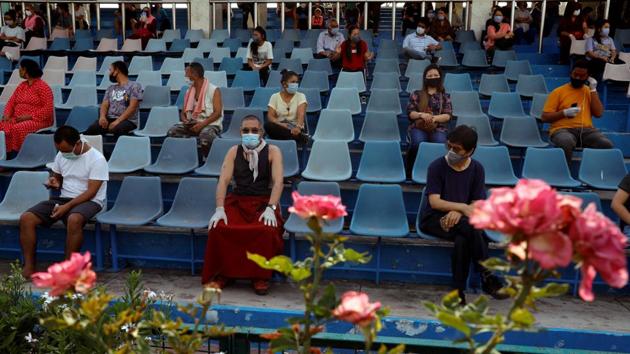Govt plans random testing for community surveillance
The samples will be collected as throat and nasal swabs for an RT-PCR test, which detects the presence of the virus, and as blood for ELISA tests that detect if a person has a type of antibodies called IgG.
Every week, 200 people will be tested at health facilities in each of India’s 733 districts to check whether they have or have had the coronavirus disease (Covid-19), the Union health ministry said in new guidelines released on Monday, charting out a comprehensive community surveillance strategy that experts have long said was crucial in managing the outbreak.

The guidelines have been sent by the Union health ministry to all districts, which will now need to select 10 health facilities – of these six need to be run by the state – where certain sets of people will be put to swab as well as blood tests. The swab tests identify a concurrent infection while the blood tests can detect if a person has previously had the infection and is now fighting or has fought it off.
“There is a need to establish systematic surveillance for Sars-CoV-2 infection in all districts of country. This surveillance will be in addition to the routine testing as per current testing guidelines,” says the document titled District level facility based surveillance for Covid-19.
“The purpose of surveillance in an outbreak situation is to establish a trend on how far the disease is spreading; what is the pattern like; which areas are more affected and where the containment measures are succeeding. The preparations have already begun for this survey that will be conducted at the district level,” said a senior government official, who didn’t wish to be identified.
The ministry did not specify when the protocol will be put into place.
According to the document, the 200 weekly samples will be divided into high risk and low risk groups. The high risk individuals have been identified as health workers, from whom 100 samples will be collected.
The remaining 100, considered in low risk, will be evenly split between out-patient department (OPD) visitors and pregnant women. The OPD patients will include people who do not show signs of an influenza-like illness (ILI), a category of people from whom samples are routinely taken for testing for Covid-19.
The samples will be collected as throat and nasal swabs for an RT-PCR test, which detects the presence of the virus, and as blood for ELISA tests that detect if a person has a type of antibodies called IgG.
“In subsequent rounds, IgG ELISA based testing of serum samples will replace RT-PCR based testing for surveillance purpose,” the guidelines added.
The swab samples will be tested in pools – a strategy that reduces the number of tests that will actually need to be carried. According to guidelines, the 200 samples will be split into batches of 25.
The strategy dictates that if a batch tests positive, only then will the individual samples need to be tested.
Experts welcomed the move, saying it will be more effective to check the extent of disease spread than current measures. “This is a systematic surveillance for action, and there is high relevance of choosing pregnant women because usually pregnant women are at the least risk of getting infected because of normally not engaging in a behaviour that can make them vulnerable towards contracting an infection. So, if a pregnant woman is found to be positive it would reflect the extent of disease spread,” said Giridhara R Babu, professor and head Lifecourse Epidemiology, Public Health Foundation of India.
“And testing healthcare workers is necessary as these are front line workers at the highest risk, so you need to check they don’t become the vectors,” he added.
“Pooling samples for testing is the best way to save precious resources but the only thing is, it needs to be done at a place where disease prevalence is low; the ICMR guidelines recommend about 2%. If it is done in a high prevalence district then you will have to test samples individually again and again for different batches, which would defeat the purpose,” said Dr Ekta Gupta, senior virologist, Institute of Liver and Biliary Sciences, which is one of the approved labs for Covid-19 testing.
The move comes a day after the India’s top medical research lab – the National Institute of Virology (NIV) in Pune – announced that it had created an ELISA test to detect antibodies.
Antibody testing has been controversial in the world over since initial test kits, imported mostly from Chinese companies, turned out to be unreliable.
The tests will be done in addition to the random testing of severe acute respiratory infection (SARI) and influenza-like illness (ILI), for which at least 250 samples are being lifted from each district as reported by HT on May 7.
“The sampling will have to be done in all districts, which is going to be crucial in determining the prevalence of Covid-19 in our community. It is important,” said health minister Harsh Vardhan, while conducting review of the Covid-19 situation in one of the states on Thursday, referring to the tests on SARI and ILI patients.
Get Current Updates on India News, Lok Sabha election 2024 live, Election 2024 along with Latest News and Top Headlines from India and around the world.




